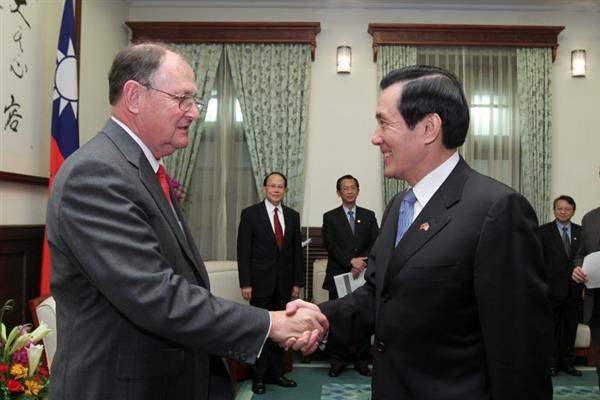News & activities
 News releases
News releases
President Ma Ying-jeou met on the afternoon of April 8 with Prof. David Brady, Deputy Director and Davies Family Senior Fellow at the Hoover Institution at Stanford University. The president lauded the Hoover Institution for its outstanding contributions to the research of modern Chinese history. He also explained to Prof. Brady the positive impact that the improvement in cross-strait relations is having on stability in East Asia and peace in the Taiwan Strait.
The president noted that Prof. Brady is highly regarded in the American political science community, and that the Hoover Institution and the ROC maintain a strong relationship. The institution is a hub for research into mainland China- and Taiwan-related issues, and in recent years the institution's collection of former President Chiang Kai-shek's diaries and the files of T.V. Soong and H.H. Kung have helped make it a global center for research into modern Chinese history. An endless stream of researchers from Taiwan, mainland China, the United States, and Europe make their way to the institution, putting the collections of documents there to maximum use, he said.
President Ma mentioned that he has been to the Hoover Institution on a number of occasions, his first visit being in 1971 when he was invited as a junior in university to make a trip to the United States and stayed in California for three weeks. His most recent trip there was five years ago, and at that time former President Chiang Kai-shek's diaries were beginning to be made available to the public. President Ma delivered a speech there on that visit and exchanged opinions with students and faculty. The president said that he came to realize that the information stored at the university was not only in safe hands, but also would be put to maximum use.
On the subject of cross-strait relations, the president remarked that in the almost three years he has been president he has strived to improve cross-strait ties, and these efforts have yielded the signing of 15 agreements. President Ma expressed the hope that greater interaction between the two sides will continue to reduce hostility and alleviate tension, thereby contributing to peace in the region. The president also stated that trust has been restored at the highest levels between the ROC and the United States and Japan, as evidenced by the American government's decision to sell defensive arms to Taiwan twice in the past three years. Meanwhile, Taiwan and Japan have signed a youth working holiday agreement and direct flights have commenced between Taipei's Songshan Airport and Tokyo's Haneda Airport. Taiwan has also established a representative office in Sapporo, and the Japanese parliament, the Diet, recently passed legislation to prevent third parties from impounding important foreign cultural artifacts on display in Japan. This, he said, will pave the way for Taiwan's National Palace Museum to exhibit pieces from its collection in Japan. All of these developments demonstrate that an improvement in cross-strait relations has ushered in benefits for Taiwan in terms of its ties with the international community.
President Ma stressed that when mainland Chinese leader Hu Jintao visited the United States early this year, the United States expressed its support for the signing of the cross-strait Economic Cooperation Framework Agreement, and also called for a continued increase in interaction between the two sides of the Taiwan Strait, while US President Barack Obama reiterated that the United States will continue to abide by the Taiwan Relations Act in conducting relations with Taiwan. President Ma expressed his appreciation for the friendship extended to Taiwan by the United States, stated his hope that Taiwan will be included in the US Visa-Waiver Program, and called for the two countries to sign an extradition agreement.
Prof. Brady was accompanied to the Presidential Office by Vice Minister of Foreign Affairs Thomas Ping-Fu Hou to meet President Ma. Also attending the meeting was National Security Council Deputy Secretary-General Chih-kung Liu.



